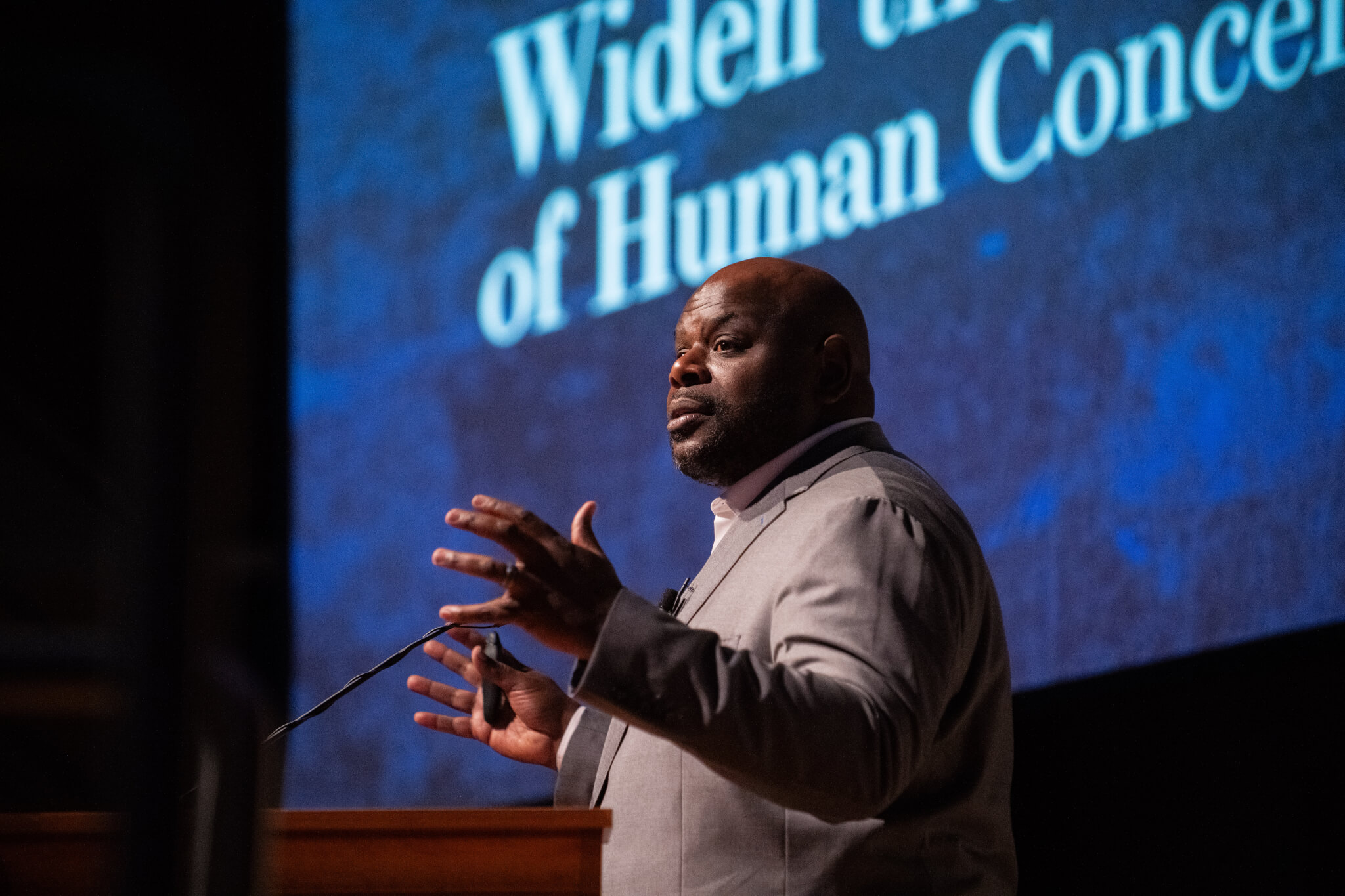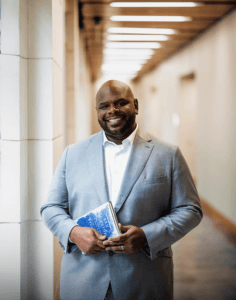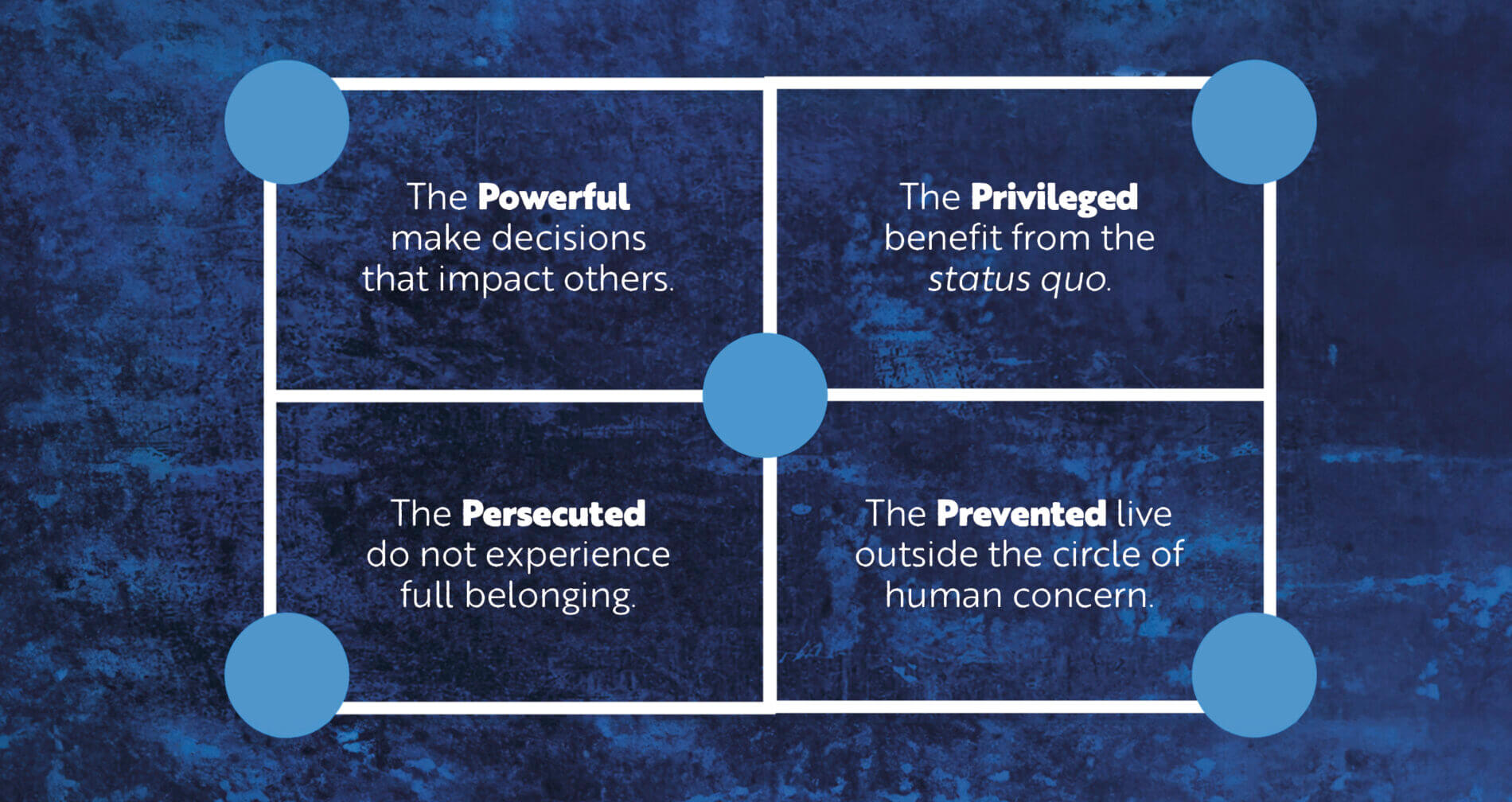
| Watch the video above, and you’ll see something of a cross-section of San Antonio, Texas. |
|---|
You’ve got business leaders and nonprofit leaders. You’ve got activists from different sides of town. An art gallery owner who specializes in undiscovered talent. A residential housing developer. A commercial real estate developer. You’ve got educators from various school districts. A pastor from the far northwest side, and one from downtown San Antonio, plus other ministers from parts of town so historic and distinct that everyone capitalizes them: Westside, Eastside, Southside.
Getting all those different people in the same room and encouraging them to talk to each other is the whole point and purpose of this event: the Know Your Neighbor Luncheon. This year marked our third annual effort at bringing together a range of San Antonians to learn about the challenges facing our community.
 Our speaker was Ben McBride, a pastor, community organizer, and author of Troubling the Water: The Urgent Work of Radical Belonging. McBride’s talk focused on how his Oakland-based organization, Empower Initiative, builds bridges across the social, political, and economic divisions roiling our country. They design workshops and learning experiences that inspire people to, as McBride puts it, “widen the circle of human concern.”
Our speaker was Ben McBride, a pastor, community organizer, and author of Troubling the Water: The Urgent Work of Radical Belonging. McBride’s talk focused on how his Oakland-based organization, Empower Initiative, builds bridges across the social, political, and economic divisions roiling our country. They design workshops and learning experiences that inspire people to, as McBride puts it, “widen the circle of human concern.”
In his introduction to this issue of Echoes, H. E. Butt Foundation President David Rogers shares the story of his firsthand encounter with one of McBride’s key insights: that people tend to be divided into four quadrants he calls the Privileged, the Powerful, the Persecuted, and the Prevented.

But the quadrants are not necessarily cages—some of us experience multiple quadrants over time. McBride explains that as a Black man in the United States, he has experienced being persecuted and even prevented from accessing certain opportunities and spaces. As a business owner, he has power that comes with rank and authority. And as a male in male-dominant spaces, he’s enjoyed privilege that others lack.
McBride’s expertise in these issues stems in part from his long tenure addressing one of our country’s thorniest problems—inner-city gun violence and related conflicts between police and community members. He told the story of moving with his family into East Oakland in 2008. Their home was in the middle of “the kill zone,” a neighborhood where 70 percent of the city’s homicides occurred.
McBride, his wife, Gynelle, and their three young daughters would often come home to find a stranger sitting on his steps—the same stranger every time, a mysterious guy who just kept hanging out on their front steps. McBride would ask him to leave, but soon the man would be back, just sitting there.
One day, McBride came home, saw the man again, and felt he had to confront him more brusquely. “Are we going to do this again?” he asked. “Can you get off my stairs? Why are you here every day?”
The man looked up and caught McBride’s eyes. “Man, no disrespect,” he said. “But I grew up in this house. I used to live here.” He explained that he’d lost his mom, and sitting on those steps was his way of being close to her—of being where he felt he belonged.
McBride turned this story into an invitation: Let’s widen our circle of human concern to include those people we tend to dismiss or ignore or even those we confront.
He told the story of moving with his family into a neighborhood where 70% of the city’s homicides occurred.
Two other speakers extended McBride’s themes into the San Antonio community. Patricia Mejia, the Spurs Sports and Entertainment Vice President of Inclusive Engagement, spoke of the city’s many under-celebrated bridge-builders who have been working for community healing for decades. Gabrielle Michelle Leonard, founder of a ministry called Returning to Joy and a community facilitator for Know Your Neighbor, shared her deep sense of calling to the work of helping people overcome bias and suspicion.
Unfortunately, a rain delay at the beginning of the luncheon meant less time for table talk this year. But no one was complaining—all of us in Texas will take whatever rain we can get. Many attendees tell us they made the most of their time, diving in quickly and making plans to keep building connections.
Through Know Your Neighbor, we’ll keep creating opportunities to do just that. (If you live in the San Antonio area, sign up at knowyourneighbor.com to make sure you receive event announcements. We have something happening most every month of the year!)
The rain softened as the luncheon wore on, and as we finished, blue skies emerged overhead. Outside, Slow Boogies—a craft root beer company staffed by teens from the city’s Eastside—slid open their food truck window and started making the most delicious floats you’ve ever tasted. Luncheon guests lingered, sipping their floats and getting to know each other a bit more.
“Let’s widen our circle of human concern to include those people we tend to dismiss or ignore or even those we confront.”